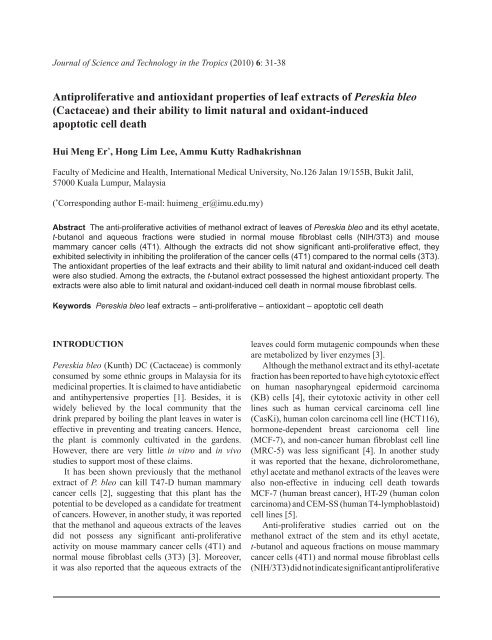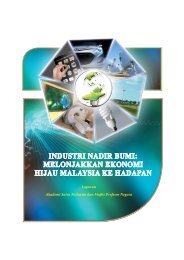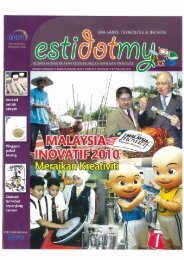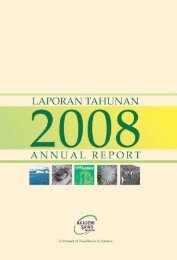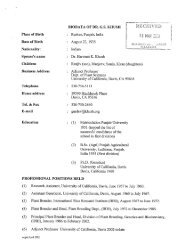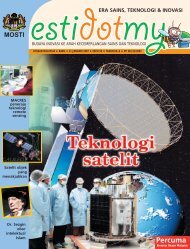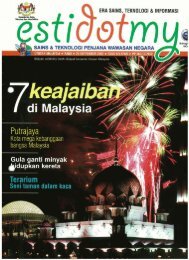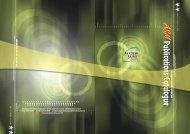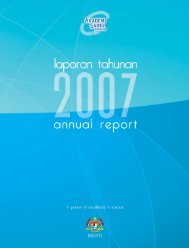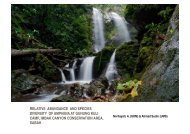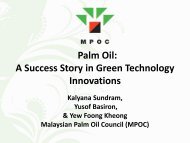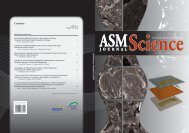Download - Akademi Sains Malaysia
Download - Akademi Sains Malaysia
Download - Akademi Sains Malaysia
You also want an ePaper? Increase the reach of your titles
YUMPU automatically turns print PDFs into web optimized ePapers that Google loves.
Journal of Science and Technology in the Tropics (2010) 6: 31-38<br />
Antiproliferative and antioxidant properties of leaf extracts of Pereskia bleo<br />
(Cactaceae) and their ability to limit natural and oxidant-induced<br />
apoptotic cell death<br />
Hui Meng Er * , Hong Lim Lee, Ammu Kutty Radhakrishnan<br />
Faculty of Medicine and Health, International Medical University, No.126 Jalan 19/155B, Bukit Jalil,<br />
57000 Kuala Lumpur, <strong>Malaysia</strong><br />
( * Corresponding author E-mail: huimeng_er@imu.edu.my)<br />
Abstract The anti-proliferative activities of methanol extract of leaves of Pereskia bleo and its ethyl acetate,<br />
t-butanol and aqueous fractions were studied in normal mouse fibroblast cells (NIH/3T3) and mouse<br />
mammary cancer cells (4T1). Although the extracts did not show significant anti-proliferative effect, they<br />
exhibited selectivity in inhibiting the proliferation of the cancer cells (4T1) compared to the normal cells (3T3).<br />
The antioxidant properties of the leaf extracts and their ability to limit natural and oxidant-induced cell death<br />
were also studied. Among the extracts, the t-butanol extract possessed the highest antioxidant property. The<br />
extracts were also able to limit natural and oxidant-induced cell death in normal mouse fibroblast cells.<br />
Keywords Pereskia bleo leaf extracts – anti-proliferative – antioxidant – apoptotic cell death<br />
INTRODUCTION<br />
Pereskia bleo (Kunth) DC (Cactaceae) is commonly<br />
consumed by some ethnic groups in <strong>Malaysia</strong> for its<br />
medicinal properties. It is claimed to have antidiabetic<br />
and antihypertensive properties [1]. Besides, it is<br />
widely believed by the local community that the<br />
drink prepared by boiling the plant leaves in water is<br />
effective in preventing and treating cancers. Hence,<br />
the plant is commonly cultivated in the gardens.<br />
However, there are very little in vitro and in vivo<br />
studies to support most of these claims.<br />
It has been shown previously that the methanol<br />
extract of P. bleo can kill T47-D human mammary<br />
cancer cells [2], suggesting that this plant has the<br />
potential to be developed as a candidate for treatment<br />
of cancers. However, in another study, it was reported<br />
that the methanol and aqueous extracts of the leaves<br />
did not possess any significant anti-proliferative<br />
activity on mouse mammary cancer cells (4T1) and<br />
normal mouse fibroblast cells (3T3) [3]. Moreover,<br />
it was also reported that the aqueous extracts of the<br />
leaves could form mutagenic compounds when these<br />
are metabolized by liver enzymes [3].<br />
Although the methanol extract and its ethyl-acetate<br />
fraction has been reported to have high cytotoxic effect<br />
on human nasopharyngeal epidermoid carcinoma<br />
(KB) cells [4], their cytotoxic activity in other cell<br />
lines such as human cervical carcinoma cell line<br />
(CasKi), human colon carcinoma cell line (HCT116),<br />
hormone-dependent breast carcionoma cell line<br />
(MCF-7), and non-cancer human fibroblast cell line<br />
(MRC-5) was less significant [4]. In another study<br />
it was reported that the hexane, dichroloromethane,<br />
ethyl acetate and methanol extracts of the leaves were<br />
also non-effective in inducing cell death towards<br />
MCF-7 (human breast cancer), HT-29 (human colon<br />
carcinoma) and CEM-SS (human T4-lymphoblastoid)<br />
cell lines [5].<br />
Anti-proliferative studies carried out on the<br />
methanol extract of the stem and its ethyl acetate,<br />
t-butanol and aqueous fractions on mouse mammary<br />
cancer cells (4T1) and normal mouse fibroblast cells<br />
(NIH/3T3) did not indicate significant antiproliferative<br />
Jostt vol 6.indd 31 7/22/10 10:09:07 PM<br />
31<br />
Journal of Science and Technology in the Tropics (2009) 5: 117-123


